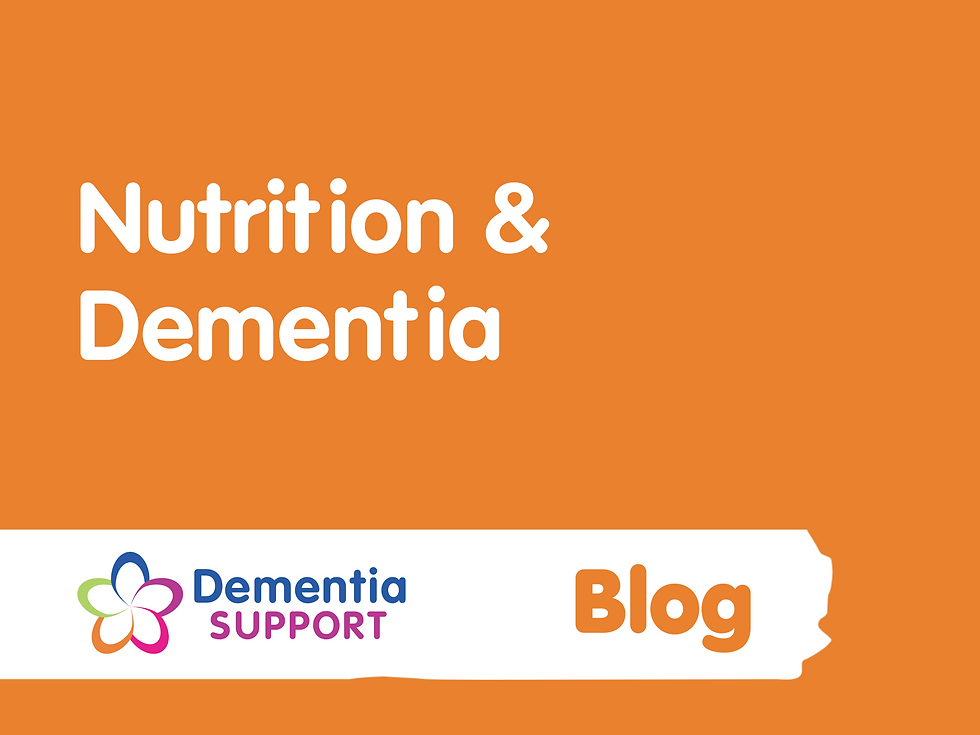Sleep & Dementia
- Dementia Support

- Oct 11, 2022
- 4 min read
Updated: Jul 29, 2025
Identify the Patterns and Build Routines
A good night's sleep isn’t a luxury - it’s a necessity!
Problems with sleep often cause exhaustion not only for the person with dementia but also for the carer especially if they are being frequently woken at night.
For all of us, poor sleep will bring challenges in functioning during the day and result in a lower quality of life. It is therefore especially important to encourage a healthy sleep routine.
The sleep-wake cycle
Our sleep-wake cycle is one of our internal processes following a 24-hour cycle known as circadian rhythms. These circadian rhythms respond primarily to light and darkness.
The brain contains our master clock which keeps everything in time. Light received resets the clock to correspond to the day-night cycle, alerting signals to promote wakefulness and to switch off the sleep drive or vice versa.
Sleep is initiated by both the body clock and “sleep pressure” – this is the need to sleep after being awake for a period of time. Stimulants such as coffee can block the chemicals which create the feeling or pressure of sleepiness especially if they are consumed later in the day.
Sleep and dementia
People living with dementia may develop new or altered sleep patterns. This could be related to:
Changes to the area of the brain which controls sleep pressure
Physical conditions such as urine infections
Pain from other conditions such as arthritis
Environmental factors including lighting, noise, or temperature
If an individual experiences ongoing problems with sleep it is important to speak to the GP or a community mental health nurse. They will try to identify the cause and understand how best to deal with the situation. This could be treating pain or infection, making medication changes or introducing new medication such as melatonin (the hormone which tells your brain that it is dark and to go to sleep).

Sleep medication is not always recommended in people with dementia so non-drug treatments and strategies are likely to be the first go to. Keeping a sleep diary to note how frequently the issues occur and if there are any triggers or patterns can be really helpful though for sharing with a GP who might also refer onto a specialist if this is required.
Good Sleep Strategies for People living dementia:
Daily routine: Set the morning alarm for the same time each day. A clock showing whether it is morning or night-time can be very beneficial. Try to wake the person at the same time each morning and keep to a routine throughout the day around washing, dressing and mealtimes.
Natural light: This will encourage the body’s natural wake-sleep cycle through increasing melatonin levels. Ensure particularly in the morning that the person gets adequate natural light outside or sitting by a window especially in the winter.
Lighting: Ensure there is adequate lighting inside either artificial or natural during the day. In the evening at dusk draw the curtains but keep lighting on inside and then towards evening / bedtime dim the lights. (this links to our blog on sundowning which might be of interest)
Activity: Encourage daily activity preferably outdoors either walking or gardening for at least 20-30 minutes.
Naps: If the person needs to nap in the day try to restrict this to a short nap in the morning or straight after lunch so it does not interfere with night-time sleep.
Early Evening: Encourage the person to do light exercise or a calm activity to wind down. Avoid stimulants in the evening such as caffeine or alcohol). Have a light snack for supper
Bedroom: Where possible try to keep the bedroom for night-time use only. The room should be uncluttered, dark, quiet and a good temperature. For safety an amber nightlight or low-level light can be used, but ideally use sensor lights which turn on when movement is detected.
Bedtime: Use a bedtime cue, e.g., the 10’oclock news, turning off light and familiar routines. Keep a regular routine with same time bedtime, nightwear on & hygiene routine. Discourage TV or reading at bedtime - keep this activity for the living room and try soft music in the bedroom to assist sleep.
Not quite ready for Bed?
If the individual is not ready to sleep, make sure the environment is safe for them to walk around until they have completed whatever it is they feel they need to do before going to bed. Go with the flow.
If the person does not live alone, it is useful for others in the property to all get ready for bed at the same time as it can act as a cue.
What more can you do?
It may take a few weeks to establish a good sleep routine, but it is worth persevering with the tips above to achieve this.
Our free Wayfinding service are available to chat through any of the above and can share examples of some of equipment and technology that we have mentioned with lighting and clocks – just get in touch to find out more.
Final Thought
Our Wayfinding Team are always here to help but adjusting and educating ourselves is for some the first step on the journey. Offering free advice and guidance for your whole dementia journey, even from before you have a formal diagnosis. The Wayfinders can also sign post to other services we work with to provide holistic, person-centred support.
If you have concerns about your loved one's memory, you can contact our Wayfinders on 01243 888691. They can support you and your loved ones for your whole journey with dementia, from pre-diagnosis to end of life care.
.png)


